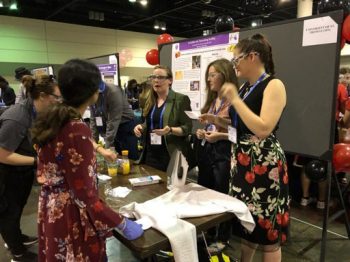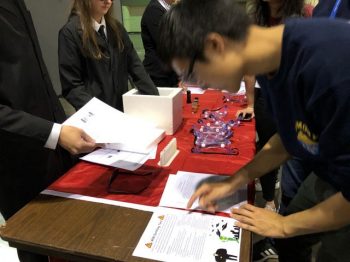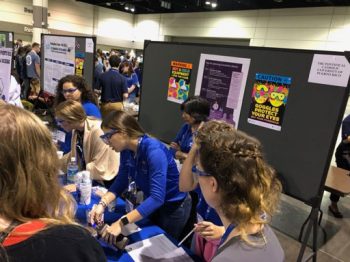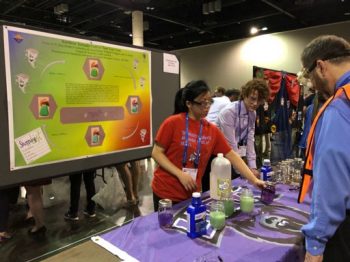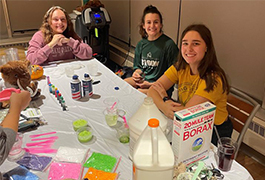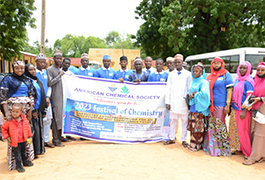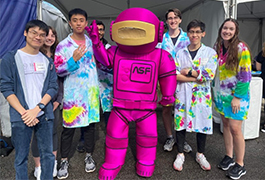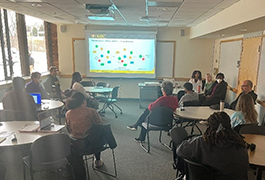How To Get Your ChemDemo Exchange Application Approved
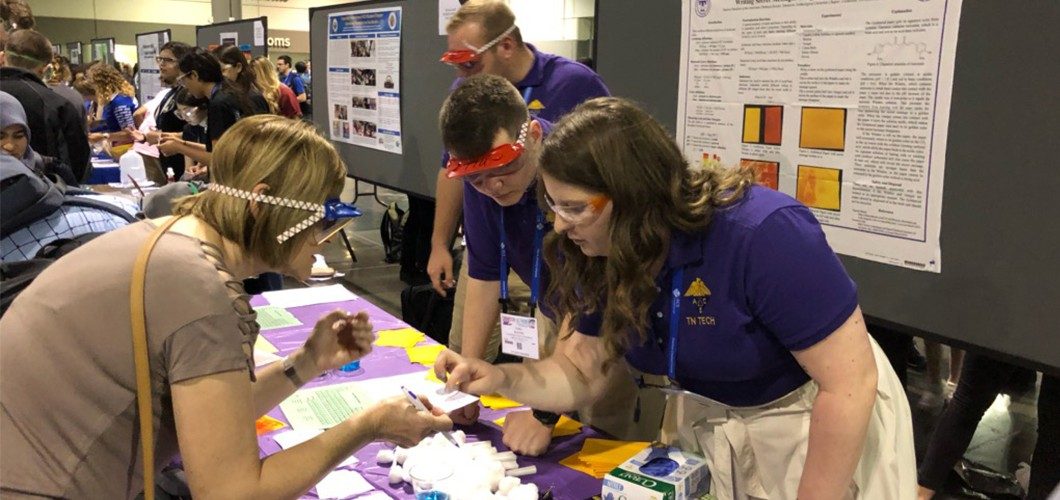
Each fall, ACS student chapters and grad student organizations apply to participate in the ever popular ChemDemo Exchange. Held at ACS Spring meetings, participants share fun, hands-on activities that use only household chemicals with hundreds of meeting attendees.
Unfortunately, many chapters miss out on the opportunity. Up to one-third of applications are denied, usually for reasons that could easily be avoided, like submitting after the deadline.
If you want in, the following tips will help ensure your chapter has a chance to participate.
1: Meet or beat the deadlines
Missing the deadline is the most common reason applications are denied. Deadlines are firm and cannot be extended because the convention center and local fire marshal need time to review and prepare for the event and any emergencies that may arise. Because those preparations are based on the information ACS collects from the applications, deadlines must be strictly observed.
The application system opens in the fall, and chapters typically have about 2 months to propose an activity, participate in the required safety webinar, and complete the application.
Reviewers will provide feedback, and applicants have 1 week to respond to the feedback. Approximately 1 month before the ChemDemo Exchange, chapters must confirm their participation and agree to adhere to the approved activity.
You can save yourself stress and worry by completing your application and confirmation before the deadline.
2024 ChemDemo Exchange Timeline
The 2024 ChemDemo exchange will be held at the Spring 2024 ACS Meeting in New Orleans, LA, on March 17.
Oct. 1, 2023 — Application system opens
Nov. 8, 2023 — Live safety webinar: watch recording on-demand by Dec. 15)
Dec. 15, 2023 — Application system closes
Jan. 16, 2024 — Applicants receive feedback from reviewers
Jan. 23, 2024 — Deadline to respond to reviewer feedback
Feb. 14, 2024 — Deadline to confirm participation in ChemDemo Exchange
Mar. 17, 2024 — ChemDemo Exchange at ACS Spring 2024
2: Get creative
Your chapter may love making slime, but if another chapter submits a slime activity first, you will be asked to submit a new activity. This is to ensure that attendees engage in a variety of activities. Remember, the deadline is firm, so it’s really important that you submit your application early in case the activity you submit has already been claimed by another chapter.
The best way to avoid this scenario is to brainstorm different topics to explore or innovative ways to demonstrate chemistry. Creative activities always generate a lot of excitement among attendees, so flex your creativity.
The more novel your activity, the more likely it will be accepted on your first application attempt.
3: Be clear about the chemistry concept you want to teach
It is far more common for reviewers to request changes to the activities than to reject them outright. Stay focused on the concept you want to teach with your activity, rather than the activity itself, and you will have an easier time adjusting it to reviewer feedback.
For example, say you want to discuss how exothermic reactions work. The thermite reaction (in which iron oxide and aluminum powder are ignited to create a brilliant stream of molten iron) is a dramatic and eye-catching example. However, the extreme heat, open molten iron, and abundance of sparks generated would not be allowed in the convention center.
But there are other ways to discuss exothermic reactions. You could use acetate-based heating pads or another reaction with fewer safety restrictions. Or you could film your group doing the thermite reaction at your institution (with appropriate safety precautions) and use the video as a discussion point.
Look for ways to get your point across with safety at the forefront. And remember to make any requested changes by the deadline!
4: Think through the logistics
Your chapter may be accustomed to performing activities in venues with easy access to sinks or running water, but rooms in convention centers don’t have typical equipment and supplies.
Planning out the logistics now has two benefits: (1) you will reduce the number of changes the reviewers request, and (2) you will be better prepared to address the safety analysis for your application (see Tip 5).
You will also be expected to bring in and remove all of your materials. All participants will be provided with a table, a posterboard, and access to disposal for nonhazardous liquids or solids used in your experiment. You can also request to have ice or electricity in your application.
The following are always prohibited at the ChemDemo Exchange. If you have them in your activity, your application will not be accepted.
- Eating, tasting
- Projectiles
- Open flames, sparks
- Liquid nitrogen or dry ice
- Toxic fumes and gases
- Radioactive materials, devices
- Latex
To help fully plan logistics, here are questions to consider:
- What materials (chemicals, equipment, PPE) will we need for the activity?
- How will we bring the materials from our institution to the event? How will we transport them through the convention center? (Many convention centers do not allow carts.)
- What emergencies are likely to happen around a crowded table in a noisy room? What equipment will we need to bring? (Hint: you can focus on “small” emergencies, like spills and splashes. “Large” emergencies, like fires and hurricanes will be addressed by the convention center.)
- Will you need electricity or ice? If so, you will need to request these in your application.
- What materials will be left over? What reaction products and by-products will we have, and how will we dispose of them?
5: Get detailed about your safety plan
How does ACS ensure that hundreds of people engaging in hands-on science in one room stay safe? By requiring the applicants provide a detailed safety plan! ACS also evaluates all the reactants, reaction steps, and products to ensure that they can function safely side by side.
For your application to be accepted, you must provide and do the following:
- A detailed, step-by-step procedure
- A completed safety analysis using the provided template for RAMP (Recognize hazards, Assess risk, Minimize risk, and Prepare for emergencies)
- Attend safety training session (takes place in November). The webinar covers how to complete the RAMP template, ACS requirements, and general safety guidelines.
- An inventory of materials, including the amounts you will bring
- Safety data sheets (SDSs) for all of your chemicals
The reviewers will look closely at your procedure and safety analysis. The safety training session in November will help you prepare your safety analysis. Your inventory and SDS will be given to the convention center and fire marshal to make sure your activity is in compliance with safety regulations.
Final thoughts
Although these steps may seem like a lot of work for a simple activity, the result is a safe and fun event.
If your student chapter has a great activity to share, start planning for your application now. With some advance planning and teamwork, your activity will be accepted and your chapter will get a chance to shine at the ChemDemo Exchange.

